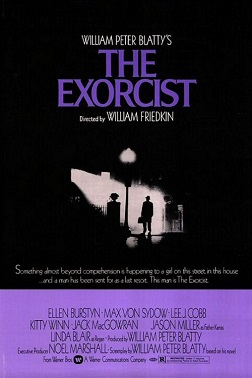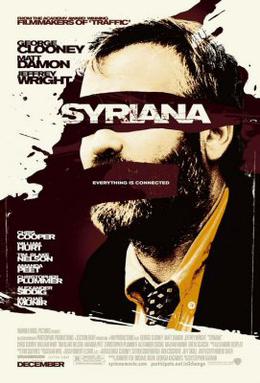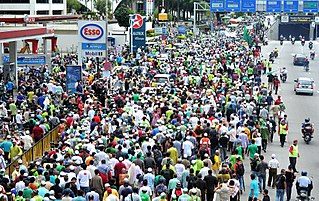
The Egyptian Armed Forces are the military forces of the Arab Republic of Egypt. They consist of the Egyptian Army, Egyptian Navy, Egyptian Air Force and Egyptian Air Defense Forces.

The USS Cole bombing was a suicide attack by al-Qaeda against USS Cole, a guided missile destroyer of the United States Navy, on 12 October 2000, while she was being refueled in Yemen's Aden harbor.

Traffic is a 2000 American crime drama film directed by Steven Soderbergh and written by Stephen Gaghan. It explores the illegal drug trade from several perspectives: users, enforcers, politicians, and traffickers. Their stories are edited together throughout the film, although some characters do not meet each other. The film is an adaptation of the 1989 British Channel 4 television series Traffik. The film stars an international ensemble cast, including Don Cheadle, Benicio del Toro, Michael Douglas, Erika Christensen, Luis Guzmán, Dennis Quaid, Catherine Zeta-Jones, Jacob Vargas, Tomas Milian, Topher Grace, James Brolin, Steven Bauer, and Benjamin Bratt. It features both English and Spanish-language dialogue.

The Ninth Configuration is a 1980 American psychological drama film written, produced, and directed by William Peter Blatty, in his directorial debut. It is the second installment in Blatty's "Trilogy of Faith" after The Exorcist (1973), and followed by The Exorcist III (1990). The film is based on Blatty's 1978 novel The Ninth Configuration, which was itself a reworking of his 1966 novel Twinkle, Twinkle, "Killer" Kane! The initial 1966 publication of the novel featured an exclamation mark at the end of the title, while all subsequent publications saw it removed.

William David Friedkin was an American film, television and opera director, producer, and screenwriter who was closely identified with the "New Hollywood" movement of the 1970s. Beginning his career in documentaries in the early 1960s, he is best known for his crime thriller film The French Connection (1971), which won five Academy Awards, including Best Picture and Best Director, and the horror film The Exorcist (1973), which earned him another Academy Award nomination for Best Director.

The Exorcist is a 1973 American supernatural horror film directed by William Friedkin from a screenplay by William Peter Blatty, based on his 1971 novel. The film stars Ellen Burstyn, Max von Sydow, Jason Miller, and Linda Blair, and follows the demonic possession of a young girl and her mother's attempt to rescue her through an exorcism by two Catholic priests.
With respect to human trafficking, Saudi Arabia was designated, together with Italy, Japan, Turkey, United Arab Emirates, Uruguay, Germany, Greece, Croatia, Israel, Iceland, Norway, and Angola, as a Tier 2 country by the United States Department of State in its 2021 Trafficking in Persons Report required by the Victims of Trafficking and Violence Protection Act of 2000 on which this article was originally based. Tier 2 countries are "countries whose governments do not fully comply with the TVPA’s minimum standards, but are making significant efforts to bring themselves into compliance with those standards". The 2021 report shows some effort by the Kingdom to address the problems, but continues to classify the Kingdom as a Tier 2 country.

Syriana is a 2005 American political thriller film written and directed by Stephen Gaghan, loosely based on Robert Baer's 2003 memoir See No Evil. The film stars an ensemble cast consisting of George Clooney, Matt Damon, Jeffrey Wright, Chris Cooper, William Hurt, Tim Blake Nelson, Amanda Peet, Christopher Plummer, Alexander Siddig, and Mazhar Munir.

Stephen Gaghan is an American screenwriter and director. He is noted for writing the screenplay for Steven Soderbergh's film Traffic, based on a Channel 4 series, for which he won the Academy Award for Best Adapted Screenplay, as well as Syriana which he wrote and directed. He also wrote and directed the thriller Abandon and the family film Dolittle, and directed the drama Gold.

The Buddhist Uprising of 1966, or more widely known in Vietnam as the Crisis in Central Vietnam, was a period of civil and military unrest in South Vietnam, largely focused in the I Corps area in the north of the country in central Vietnam. The area is a heartland of Vietnamese Buddhism, and at the time, activist Buddhist monks and civilians were at the forefront of opposition to a series of military juntas that had been ruling the nation, as well as prominently questioning the escalation of the Vietnam War.

The cinema of Yemen is relatively obscure, but it has seen glimpses of influence and representation throughout the years. Since the 1920s, when expeditions from Europe arrived in Yemen, the country has been featured in various documentaries and travelogues. These early films introduced audiences to the landscapes, architecture, and culture of Yemen, providing a window into a world they might not have otherwise experienced.

In November 1963, President Ngô Đình Diệm and the Personalist Labor Revolutionary Party of the Republic of Vietnam were deposed by a group of CIA-backed Army of the Republic of Vietnam officers who disagreed with Diệm's handling of the Buddhist crisis and the North Vietnamese and Viet Cong threat to South Vietnam. In South Vietnam, the coup was referred to as Cách mạng 1-11-63.

In the years after the September 11, 2001 attack on the World Trade Center in New York City, Yemen became a key site for U.S. intelligence gathering and drone attacks on Al-Qaeda. According to the 2012 U.S. Global Leadership Report, 18% of Yemenis approved of U.S. leadership, with 59% disapproving and 23% uncertain. According to a February 2015 report from the Congressional Research Service, U.S. officials considered Al-Qaeda in the Arab Peninsula the Al-Qaeda affiliate "most likely to attempt transnational attacks against the United States."

Ethiopia–Israel relations are foreign relations between Ethiopia and Israel. Both countries re-established diplomatic relations in 1992. Ethiopia has an embassy in Tel Aviv. Israel has an embassy in Addis Ababa. Israel has been one of Ethiopia's most reliable suppliers of military assistance, supporting different Ethiopian governments during the Eritrean War of Independence.
The Arab Cold War was a political rivalry in the Arab world from the early 1950s to the late 1970s, as part of the wider Cold War. It is generally accepted that the beginning of the Arab Cold War is marked by the Egyptian revolution of 1952, which eventually led to Gamal Abdel Nasser becoming president of Egypt in 1956. Thereafter, newly formed Arab republics, defined by revolutionary secular nationalism and inspired by Nasser's Egypt, engaged in political rivalries with conservative traditionalist Arab monarchies, led by Saudi Arabia. The Iranian Revolution of 1979 is widely seen as the end of this period of internal conflict and rivalry. Ayatollah Ruhollah Khomeini was installed as the leader of Iran's theocratic government. A new era of Arab-Iranian tensions followed, overshadowing the bitterness of intra-Arab strife.

The release of the anti-Islamic short film Innocence of Muslims triggered numerous demonstrations across North Africa, the Middle East and South Asia. On September 11, 2012, dozens of protestors scaled the walls and entered the courtyard of the U.S. embassy in Cairo, Egypt. On September 13, 2012, protests occurred at the U.S. embassy in Sana'a, Yemen, resulting in the deaths of four protesters and injuries to thirty-five protesters and guards. On September 14, the U.S. consulate in Chennai was attacked, resulting in injuries to twenty-five protesters. Protesters in Tunis, Tunisia, climbed the U.S. embassy walls and set trees on fire. At least four people were killed and forty-six injured during protests in Tunis on September 15. Further protests were held at U.S. diplomatic missions and other locations in the days following the initial attacks. Related protests and attacks resulted in numerous deaths and injuries across the Middle East, Africa, Pakistan, and Afghanistan.

Beirut, also known as The Negotiator in the United Kingdom, is a 2018 American political thriller film directed by Brad Anderson and written by Tony Gilroy.

Morocco–Saudi Arabia relations refers to the current and historical relations between the Kingdom of Morocco and Kingdom of Saudi Arabia. Morocco has an embassy in Riyadh and Saudi Arabia has an embassy in Rabat.

The Tet offensive attack on the US Embassy took place on the early morning of 31 January 1968 when a 19-man Vietcong (VC) sapper team attempted to seize the US Embassy in Saigon at the start of the VC's Tet offensive. While the VC successfully penetrated the embassy compound, they were unable to enter the chancery building and were pinned down by security forces, with the lone survivor eventually surrendering to US forces. Notwithstanding the attack's failure it had a profound political and psychological impact in the United States.

















